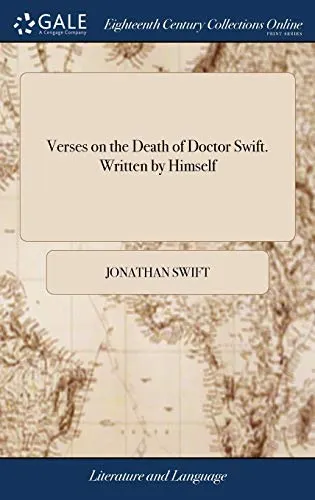Verses on the Death of Doctor Swift. Written by Himself
Nov. 1731. The Second Edition
(Author) Jonathan SwiftThe 18th century was a wealth of knowledge, exploration and rapidly growing technology and expanding record-keeping made possible by advances in the printing press. In its determination to preserve the century of revolution, Gale initiated a revolution of its own: digitization of epic proportions to preserve these invaluable works in the largest archive of its kind. Now for the first time these high-quality digital copies of original 18th century manuscripts are available in print, making them highly accessible to libraries, undergraduate students, and independent scholars. Western literary study flows out of eighteenth-century works by Alexander Pope, Daniel Defoe, Henry Fielding, Frances Burney, Denis Diderot, Johann Gottfried Herder, Johann Wolfgang von Goethe, and others. Experience the birth of the modern novel, or compare the development of language using dictionaries and grammar discourses. ++++ The below data was compiled from various identification fields in the bibliographic record of this title. This data is provided as an additional tool in helping to insure edition identification: ++++ British Library T147576 The ornament on the titlepage is a vignette of fame with a trumpet. London: printed for C. Bathurst, 1739. [2],18p.; 2°
Jonathan Swift
Jonathan Swift (1667-1745) was an Irish writer and clergyman known for his satirical works that critiqued society and politics. His most famous work, "Gulliver's Travels," is a biting satire on human nature and the flaws of society. Swift's writing is characterized by wit, irony, and a keen eye for social commentary. He was a master of the satire genre, using humor and exaggeration to shed light on the absurdities of his time. Swift's contributions to literature have had a lasting impact on the genre of satire, influencing countless writers and thinkers.


